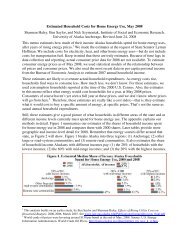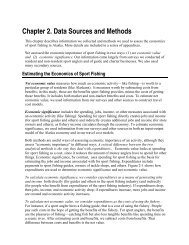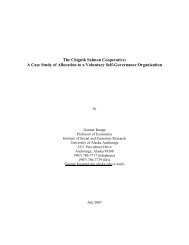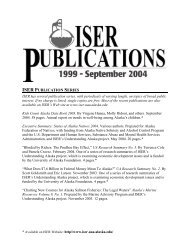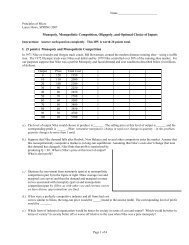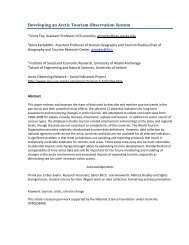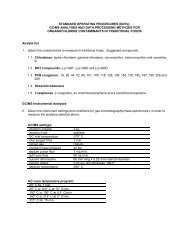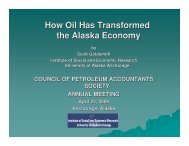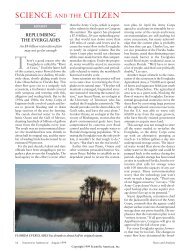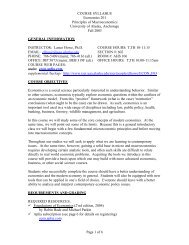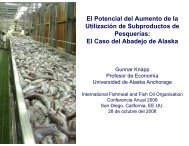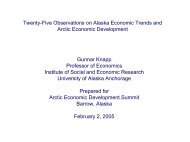Good Afternoon, My name is Don Eller. I was born and raised in ...
Good Afternoon, My name is Don Eller. I was born and raised in ...
Good Afternoon, My name is Don Eller. I was born and raised in ...
You also want an ePaper? Increase the reach of your titles
YUMPU automatically turns print PDFs into web optimized ePapers that Google loves.
<strong>Good</strong> <strong>Afternoon</strong>,<br />
<strong>My</strong> <strong>name</strong> <strong>is</strong> <strong>Don</strong> <strong>Eller</strong>. I <strong>was</strong> <strong>born</strong> <strong>and</strong> ra<strong>is</strong>ed <strong>in</strong> Tanana Alaska on the banks of the Yukon River, or at<br />
least that <strong>is</strong> what I tell people. I <strong>was</strong> actually <strong>born</strong> <strong>in</strong> Fairbanks <strong>and</strong> 22 hours later I <strong>was</strong> flown to Tanana<br />
where I lived to the age of 16, at which time my parents moved to Palmer. <strong>My</strong> parents moved primarily<br />
to further my education; s<strong>in</strong>ce I had taken all the classes the school <strong>in</strong> Tanana had to offer. Every<br />
summer, throughout high school <strong>and</strong> college at the University of Colorado Boulder, I returned to one of<br />
the communities we served <strong>and</strong> did telephone construction. Telephone work came easy to me, not<br />
because I am smart or talented, but because do<strong>in</strong>g the work <strong>was</strong> just part of my life. I <strong>was</strong> never taught<br />
or mentored <strong>in</strong> the trade; it <strong>is</strong> just what we did. <strong>My</strong> earliest memory of do<strong>in</strong>g telephone work <strong>was</strong><br />
sometime between the ages of 5 <strong>and</strong> 10 when my father had me run <strong>in</strong>side telephone wire under teacher<br />
hous<strong>in</strong>g. The hous<strong>in</strong>g <strong>was</strong> actually trailers which were low to the ground with lots of obstacles<br />
underneath. Crawl<strong>in</strong>g under the trailers would be a challenge for me today as much as it <strong>was</strong> for my<br />
father at the time, but it <strong>was</strong> great enterta<strong>in</strong>ment for a young child <strong>and</strong> so began my telecommunications<br />
career. I have had the good fortune to travel the world extensively hav<strong>in</strong>g worked overseas <strong>in</strong> rural<br />
development <strong>and</strong> been to over 70 countries. Just wanted to give you a little back ground on myself to<br />
help you underst<strong>and</strong> my perspective on rural Alaska telecom<br />
We were asked to speak on the past <strong>and</strong> future challenges of telecom <strong>in</strong> Alaska from a small company<br />
perspective. Th<strong>is</strong> <strong>is</strong> the first time I have given a speech on telecom <strong>in</strong> a long time <strong>and</strong> the first time I<br />
have ever given a talk on telecom with no peer review, boy are you all <strong>in</strong> trouble. I have been taught that<br />
the one th<strong>in</strong>g you are supposed to do when giv<strong>in</strong>g a presentation <strong>is</strong> to know your audience; so I would<br />
like to see a show of h<strong>and</strong>s of all those who have been to a village. I’m sorry, but if the population <strong>is</strong><br />
above 500 that’s not a village <strong>in</strong> Alaska, that’s a big town. Now, could I see a show of h<strong>and</strong>s of people<br />
who have actually lived <strong>in</strong> an Alaskan village for at least a year? The reason I ask <strong>is</strong> because much like<br />
be<strong>in</strong>g a tour<strong>is</strong>t <strong>in</strong> a foreign country for two weeks, you can say you have been there but your perception of<br />
the way it <strong>is</strong> <strong>and</strong> the way it actually <strong>is</strong>, are far apart. If you have not had the opportunity to spend time <strong>in</strong><br />
an Alaska Village, please take the time, it <strong>is</strong> well worth the effort. One of the best th<strong>in</strong>gs about<br />
Anchorage <strong>is</strong> that you are only about an hour away from Alaska, take advantage of it.<br />
I just returned from Tanana yesterday where I <strong>was</strong> do<strong>in</strong>g fiber splic<strong>in</strong>g. To my knowledge, Tanana will<br />
be the first community <strong>in</strong> Alaska to be served with fiber to the home. As I <strong>was</strong> sitt<strong>in</strong>g there splic<strong>in</strong>g <strong>and</strong><br />
swatt<strong>in</strong>g mosquitoes try<strong>in</strong>g to keep the bugs out of the fiber fus<strong>in</strong>g chamber, I had a lot of time to th<strong>in</strong>k<br />
about the future challenges of telecom <strong>in</strong> rural Alaska. I have narrowed it down to two areas which I<br />
believe are the greatest future challenge for telecom <strong>in</strong> rural Alaska. The first really has noth<strong>in</strong>g to do<br />
with telecom specifically but <strong>is</strong> critical for rural Alaska; I will call it Social Political Challenges. The second<br />
challenge <strong>is</strong> very easy when compared to the first; rural Alaska must replace the current third world<br />
satellite middle mile with terrestrial middle mile.<br />
Social Political Challenges are the local, state <strong>and</strong> national conditions which negatively impact the long<br />
term viability of communities <strong>in</strong> rural Alaska. One would th<strong>in</strong>k that <strong>in</strong> a small community of under 500<br />
residents where everyone knows everyone, <strong>is</strong> probably related, <strong>and</strong> sees them on a daily bas<strong>is</strong> that they<br />
could get along <strong>and</strong> work together for benefit of the community. That <strong>is</strong> typically not the case. God<br />
made the country, man made the cities, <strong>and</strong> the devil made small towns. While I d<strong>is</strong>agree with the<br />
expression, I believe the reason it came <strong>in</strong> to be<strong>in</strong>g <strong>is</strong> that conflict <strong>is</strong> magnified <strong>in</strong> a small community.<br />
When Councilman Joe's little Johnny has a fight with Councilwoman Ann's little Sally, it puts the council<br />
members at odds even on city bus<strong>in</strong>ess. Joe also works for the local native corporation, the corporation<br />
<strong>is</strong> try<strong>in</strong>g to do someth<strong>in</strong>g productive for the community but needs the approval from the local tribal office<br />
where Sally works, so that’s not happen<strong>in</strong>g <strong>and</strong> the snowball keeps grow<strong>in</strong>g. However, it could be that<br />
the local community leaders are just emulat<strong>in</strong>g the leadership at the state <strong>and</strong> national level <strong>in</strong> their<br />
logical, level headed <strong>and</strong> cooperative approach to resolv<strong>in</strong>g <strong>and</strong> implement<strong>in</strong>g solutions to <strong>is</strong>sues <strong>in</strong> much<br />
larger forums. If th<strong>is</strong> <strong>is</strong> the case, they deserve an A for effort. How do you get people to work together<br />
for their own benefit? If the communities can’t, we will see the cont<strong>in</strong>ued decl<strong>in</strong>e of rural Alaska <strong>and</strong><br />
without customers there <strong>is</strong> no need to provide <strong>in</strong>frastructure.
The state <strong>and</strong> national Social Political Challenges will be grouped together s<strong>in</strong>ce they are similar <strong>in</strong><br />
nature. There <strong>is</strong> a d<strong>is</strong>connect between many public servants, both civil <strong>and</strong> elected officials, <strong>and</strong> the<br />
reality of the public, which they are supposed to serve. In order to provide phone service, stable reliable<br />
electricity <strong>is</strong> required. In the early days of Yukon Telephone, my father found that he <strong>was</strong> spend<strong>in</strong>g more<br />
time keep<strong>in</strong>g the community generator go<strong>in</strong>g than work<strong>in</strong>g to provide phone service. He concluded that<br />
if he <strong>was</strong> go<strong>in</strong>g to be do<strong>in</strong>g the work he might as well be paid for it, so we ended up purchas<strong>in</strong>g the local<br />
electric utility <strong>in</strong> Tanana as well. Currently, <strong>in</strong> order to lower the cost electricity we have been look<strong>in</strong>g <strong>in</strong>to<br />
alternative methods for generation. We were directed by the state agency, which controls the purse<br />
str<strong>in</strong>gs for fund<strong>in</strong>g, that if we wanted any ass<strong>is</strong>tance we needed to pursue w<strong>in</strong>d. The states directive <strong>was</strong><br />
based on results from a computer model which <strong>was</strong> <strong>in</strong> direct conflict with the two w<strong>in</strong>d studies <strong>and</strong> 50<br />
years of data from the Tanana Airport prov<strong>in</strong>g that commercial w<strong>in</strong>d development <strong>is</strong> not economically<br />
viable <strong>in</strong> the <strong>in</strong>terior of Alaska. I <strong>was</strong> able to f<strong>in</strong>d though a hydro electric study done on a stream <strong>in</strong><br />
Tanana, by the predecessor to the current agency. The stream had year round flow, ideal geography<br />
<strong>and</strong> soil conditions, mak<strong>in</strong>g it great for a hydro electric site. When provided with the <strong>in</strong>formation from the<br />
study, the agency totally d<strong>is</strong>counted all the research <strong>and</strong> said, "traditional hydro electric development that<br />
far north <strong>is</strong> unfeasible." The same state agency however, <strong>in</strong>s<strong>is</strong>ts on pursu<strong>in</strong>g the Susitna Hydro project<br />
<strong>in</strong> spite of the fact that every economic study I have seen except the agencies, <strong>in</strong>dicates it’s a bad idea.<br />
<strong>My</strong> response to the state agency <strong>was</strong> th<strong>is</strong>, "So the state <strong>is</strong> not will<strong>in</strong>g to r<strong>is</strong>k 5 million dollars prov<strong>in</strong>g that<br />
hydro electric power <strong>is</strong> a viable alternative <strong>in</strong> an environment where electricity costs over $0.50 kwh <strong>and</strong><br />
there are no other known alternatives at th<strong>is</strong> time, but it <strong>is</strong> will<strong>in</strong>g to r<strong>is</strong>k 5 billion dollars for a project under<br />
similar conditions to Tanana where electricity cost $0.15 kwh with numerous other economical<br />
alternatives."<br />
As you can see, I really know how to w<strong>in</strong> friends. I th<strong>in</strong>k it <strong>is</strong> genetic because <strong>in</strong> one of the best l<strong>in</strong>es<br />
ever spoken at the APUC, the precursor to the RCA, <strong>was</strong> blurted out by my father <strong>in</strong> the middle of a rate<br />
case. D<strong>is</strong>mayed <strong>and</strong> d<strong>is</strong>gruntled at the costs <strong>in</strong>volved with lawyers <strong>and</strong> expert witnesses for the rate<br />
case, my father enthusiastically said," <strong>My</strong> customers cannot afford your due process", <strong>and</strong> I agree. Is it<br />
necessary for a utility with much less than a million dollars of revenue a year to go through a full blown<br />
rate case that can easily cost over $100,000 for its 600 customers? It <strong>is</strong> an o.p.m. problem. That’s O P<br />
M, other people’s money. I believe that the public servants would have a far more reasoned, rational <strong>and</strong><br />
researched approach if it <strong>was</strong> their money at stake. That said I am not here to bash our public servants.<br />
The majority I work with are over worked, under paid, <strong>and</strong> do<strong>in</strong>g a very good job.<br />
I would be rem<strong>is</strong>s <strong>in</strong> talk<strong>in</strong>g about rural <strong>is</strong>sues if I did not mention the rural/urban conflict promoted by<br />
some for political ga<strong>in</strong>. Anchorage <strong>and</strong> Fairbanks are d<strong>is</strong>tribution hubs which benefit from rural Alaska.<br />
Out of the 11 employees of our company, only 3 of them live <strong>in</strong> rural Alaska. Two of them are part-time<br />
<strong>and</strong> all the rest live <strong>in</strong> the Mat Valley <strong>and</strong> greater Anchorage area. Out of the 2.1 million dollars spent on<br />
a tank farm <strong>in</strong> Tanana less than $100,000 <strong>was</strong> spent <strong>in</strong> Tanana, all the rest <strong>was</strong> spent <strong>in</strong> Anchorage. We<br />
are one state with rural <strong>and</strong> urban Alaska <strong>in</strong>ter-dependant on each other.<br />
Unfortunately, I do not have the answers to the social political challenges faced by me as a rural telecom<br />
provider, us, as a state, or the nation as a whole. However, us<strong>in</strong>g sound economic <strong>and</strong> technical<br />
analys<strong>is</strong> as <strong>is</strong> provided by ISER would be good place to start, if dec<strong>is</strong>ion makers will l<strong>is</strong>ten.<br />
I’m almost done, but not quite. It’s now time to talk about the easy stuff, the technical portion challenge.<br />
In order for rural Alaska to fully participate <strong>in</strong> the broadb<strong>and</strong> revolution, rural Alaska's current connection<br />
to the rest of the world, the satellite, must be replaced with terrestrial networks. There are two reasons<br />
why, cost <strong>and</strong> latency. A cheap satellite costs around $150 million dollars <strong>and</strong> the higher end versions<br />
run about $450 million dollars. They have a life span of about 12 years, ma<strong>in</strong>ly because of the thruster<br />
propellant needed to ma<strong>in</strong>ta<strong>in</strong> a stable orbit, thus middle mile transport over satellite <strong>is</strong> expensive. A T-1<br />
or 1.544 Mbps work of data over the satellite costs between $8000 <strong>and</strong> $12000 a month to rural AK. So<br />
the ability to provide high speed <strong>in</strong>ternet to rural Alaska <strong>is</strong> not a technical <strong>is</strong>sue but an economic one.<br />
Villages simply cannot afford it.<br />
Comb<strong>in</strong>e th<strong>is</strong> with the physical limits <strong>in</strong>volved <strong>in</strong> satellite transport <strong>and</strong> terrestrial middle mile transport<br />
becomes a no bra<strong>in</strong>er. Geosynchronous satellites orbit at 23,600 miles above the earth so even
travel<strong>in</strong>g at the speed of light it takes real time for <strong>in</strong>formation to be transmitted. The <strong>in</strong>formation must go<br />
from a village to the satellite, then from the satellite to downl<strong>in</strong>k <strong>and</strong> then the same process <strong>in</strong> reverse to<br />
send the reply, about a half of second. Th<strong>is</strong> may not seem like a long time to you, but just ask the<br />
network gamers <strong>in</strong> rural communities who compla<strong>in</strong> it’s not fair because they kill me before the game<br />
even starts.<br />
Comb<strong>in</strong>e the cost <strong>and</strong> latency <strong>is</strong>sues <strong>and</strong> it becomes obvious that all of Alaska needs terrestrial middle<br />
mile to replace the current satellite system. Th<strong>is</strong> <strong>is</strong> actually happen<strong>in</strong>g with GCI's fiber <strong>and</strong> terrestrial l<strong>in</strong>k<br />
to Nome <strong>and</strong> our, Yukon Telephone's, terrestrial microwave system down the Yukon River. However<br />
there are still a lot of little places out there that are hard to serve, but give us time <strong>and</strong> we'll get there. As<br />
long as there <strong>is</strong> a dollar to be made <strong>and</strong> customers to be served there will always be nerds like myself to<br />
figure out a way to make it happen.<br />
Thanks for your time <strong>and</strong> attention, I hope you enjoyed it.



